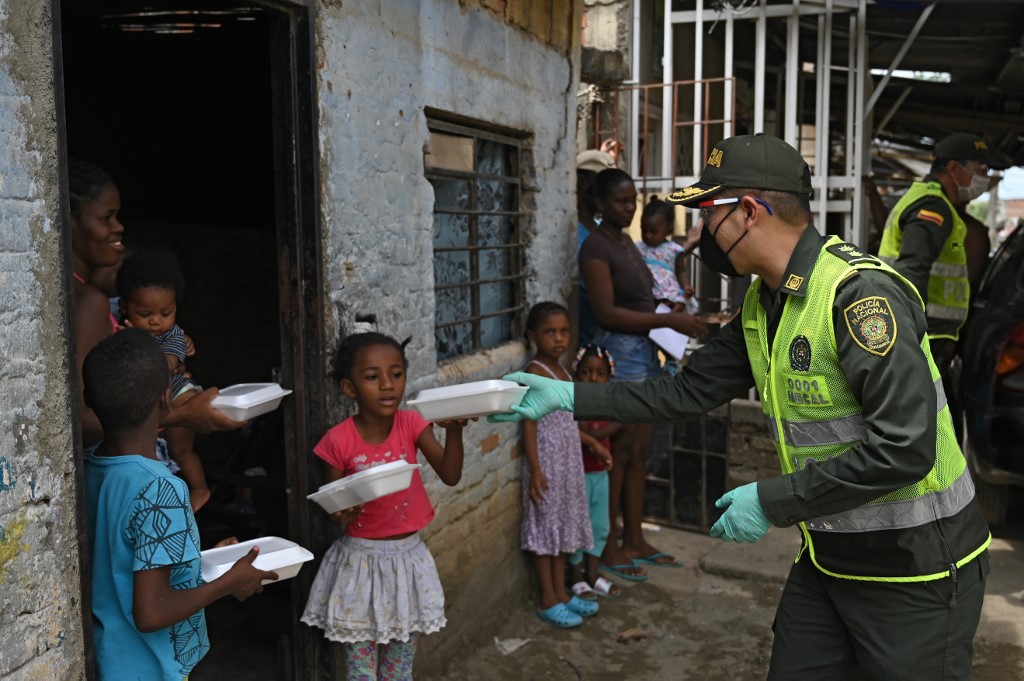Contagion or starvation: UN warns informal workers face stark choice

Cali’s police chief Manuel Vasquez (R) wears a face mask as a preventive measure against the spread of the novel coronavirus, as he delivers lunch boxes to a family in Aguablanca district in Cali, Colombia on May 6, 2020. (Photo by Luis ROBAYO / AFP)
Poverty levels are surging among the world’s two billion informal workers during the COVID-19 pandemic, the UN said Thursday, warning many were left to choose between risking infection and putting food on the table.
The novel coronavirus pandemic, which has killed more than 260,000 people globally, has devastated economies around the world and sent unemployment numbers soaring.
But the UN’s International Labour Organization warned in a fresh report that people working outside of formal economies — including many in food services, manufacturing and retail, as well as more than half a billion farmers — face particularly dire circumstances.
Such workers, who generally have no social protection, are already twice as likely to live in poverty as people with jobs in the formal sector, but the ILO said that the pandemic was set to push many more towards destitution.
Before the crisis, a full quarter of all informal workers were already considered to live in relative poverty — defined as people who make over 50 percent less than the median income in a country.
The pandemic is expected to push the share up from a quarter to 60 percent, ILO labor market specialist Florence Bonnet told a virtual briefing.
Levels of relative poverty among informal workers are meanwhile expected to swell by 56 percentage points in low-income countries; by 52 percentage points in high-income countries, and by 21 percentage points in upper middle-income countries, the ILO said.
It warned that women and girls were particularly at risk.
The ILO pointed out that some 1.6 billion of the world’s two billion informal economy workers have been affected by lockdown and containment measures, with most of them working in the hardest-hit sectors or in small units that are the most vulnerable to shocks.
‘Dilemma’
The ILO warned that since these people often live hand-to-mouth, measures put in place by governments to contain the spread of COVID-19 cannot be implemented successfully.
“Contagion or starvation is a dilemma” facing many, Philippe Marcadent, who heads the ILO’s informal work unit, told the virtual briefing.
The ILO highlighted in particular the plight of the world’s some 67 million domestic workers — the vast majority of whom do not have formal employment contracts, insisting that for them “unemployment has become as threatening as the virus itself.”
Many have been unable to continue working, while those who have kept going into work often face a high risk of infection, as they care for families in private households.
The situation is particular dire for the world’s 11 million migrant domestic workers, it said.
“The COVID-19 crisis is exacerbating already existing vulnerabilities and inequalities,” Marcadent said in a statement, calling for “policy responses (to) ensure that support reaches the workers and enterprises who need it most.”
He warned of the consequences of allowing informal workers, who account for a full six out of 10 people in the global workforce, to remain excluded from social protections, especially in the midst of a pandemic.
He also warned that the share of people working in informal settings would likely increase, with women especially forced to take informal jobs to compensate for the loss of formal employment.
For more news about the novel coronavirus click here.
What you need to know about Coronavirus.
For more information on COVID-19, call the DOH Hotline: (02) 86517800 local 1149/1150.
The Inquirer Foundation supports our healthcare frontliners and is still accepting cash donations to be deposited at Banco de Oro (BDO) current account #007960018860 or donate through PayMaya using this link.